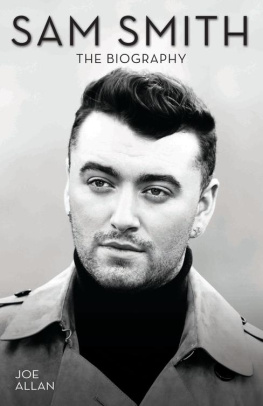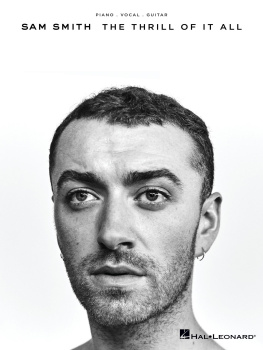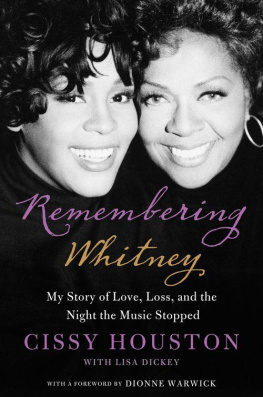To Doug. From a brother who was once a bother.
Theres something very pure and direct about the way Sam lives his life, and hes very transparent in his portrayal of his image.
Taylor Swift on why she quickly became one of Sam Smiths number one fans Rolling Stone, January 2015
O n 8 February 2015, as Stay With Me was announced as the winner of the prestigious Record of the Year award at the 57th Grammy Awards in Los Angeles, Sam Smith returned to the stage of the Staples Center, Los Angeles, to accept his fourth trophy of the night.
While the speech he made once hed reached the podium, thanking the man who had broken his heart and inspired him to create most of the songs featured on his debut album, In the Lonely Hour, was the focus of much of the media and press coverage which followed, Sams multiple trips to the stage earlier in the evening, to pick up his other awards, were equally noteworthy and demonstrated just how far hed come in a relatively short period of time.
Receiving his Best New Artist award from presenter Taylor Swift, whod already declared he was her absolute new favourite when she invited him to join her onstage for a duet of his Money On My Mind track at her London show the previous month, Sam appeared both suitably shocked and understandably elated to be receiving any form of recognition from his peers.
And as if enjoying BFF status with the biggest-selling pop artist in the world wasnt enough, over the course of that one night his position within the pecking order of the gathered music business glitterati appeared to be shifting, rising sharply in a matter of hours. On the few steps required to get him from his designated seat in the audience fortuitously situated in close proximity to the stage Sam air-kissed and hugged a veritable Whos-Who of the music industrys biggest stars, including Lady Gaga, Rihanna and Katy Perry, as well as the aforementioned Taylor Swift.
It was truly a dream come true for the twenty-two-year-old who, only a year or so earlier, had been struggling to get a foothold on even the lowest rung of the industry ladder, working full-time in a London bar and dreaming of becoming a world-famous singer. While easy comparisons could be made with Adele, the UKs other recent multiple Grammy Award winning success story, Sams journey to acceptance and worldwide acclaim was decidedly different.
Unlike Adele, and so many of the UKs artists who have enjoyed commercial success and critical acclaim, both internationally and at home in recent years (Amy Winehouse, Leona Lewis, Jessie J and Katie Melua, among many more), Sam Smith wasnt groomed for success at the esteemed BRIT School. He hadnt attended any of the UKs many music or drama colleges and he certainly didnt possess any formal qualifications that might suggest he was destined for success as a musician, specifically, or anywhere within the music business in general. In fact, he didnt even know how to play a musical instrument. But he had a voice. And while his rise may seem like a classic overnight success story, he had actually been developing his extraordinary vocal style for most of his life.
After discovering an early aptitude for mimicry, copying and often matching the power and range of some of pop musics greatest vocalists, Sam had been encouraged to further develop his natural skills and eventually found his own voice. Far from being an instant sensation, he had been trying to make it as a professional singer for close to a decade before he made his UK chart debut as a featured vocalist on Latch, the breakthrough hit for Surrey-born dance duo, Disclosure, in late 2012.
Sams early promise had been spotted by his parents, Fred and Kate, who decided to nurture their sons talent (and obvious interest in all things dramatic) by encouraging him to take singing lessons and to explore the world of musical theatre. After several years picking up invaluable tips and experiences, first as a backing singer for his singing tutor, and later performing whenever and wherever anyone was willing to listen, he began to attract attention from numerous artist managers who believed that he was destined for big things.
A decade of unfulfilled dreams and the inevitable disappointment that followed saw Sam work his way through a handful of management teams before he had even turned eighteen years old. His confidence shattered, Sam was fairly jaded about the idea of continuing to chase his dream, and wary of the music industry as a whole.
At over six foot tall and having struggled with his weight as a child and well into his teens, Sam knew he would never be a traditional, pretty-boy pop star. Physically, he was a million miles away from the likes of Olly Murs or the boys from One Direction and his ambitions as a singer were similarly far removed from the quick fix, overnight fame offered by producer and mentor Simon Cowell and reality TV shows such as The X Factor, Britains Got Talent or The Voice.
As confidence in his own abilities returned, buoyed by his newly forged relationships with several like-minded and similarly ambitious underground artists, contemporary songwriters and producers, as well as a new team of managers, Sam began to trust his own instincts about the type of artist he wanted to become. He wished to emulate the careers of his musical idols, the likes of Whitney Houston, Chaka Khan, Dinah Washington and most of all, Beyonc. Sam wanted longevity as an artist. Determined his voice would be the thing people remembered, not how he looked or which designer outfits he was wearing, he wanted the people who bought his records to believe every word he sang, and understand that those words came directly from his heart and soul. He had first-hand experience of the type of pressure placed upon new artists to invent a separate media persona, in order to create an air of mystery about them and ultimately give a hyped sense of who they really were to the public.
Previously, he had been advised by former managers about his image and choice of song. Now, he was determined to give his fans the real deal. He had no interest in creating what he saw as a false public persona, vowing instead to remain open and candid about who he was, and what he chose to sing about. Years of training and countless hours of practice had led him to the realisation that honesty and truthfulness were the key ingredients to his performance as a singer. And now, by revealing himself emotionally and channelling his own vulnerability within the lyrics of his songs, he was much more likely to make the type of natural and meaningful connection he wanted to make with his audience.
Sams debut album, In the Lonely Hour a collection of self-penned songs, exposing some painfully raw nerves and divulging the type of secrets about life and love that even the most candid artists might shy away from would become the only album of 2014 to sell more than a million copies on both sides of the Atlantic, and was to catapult him emphatically into the spotlight and onto the world stage with dizzying speed and to dramatic effect. Sam Smith is now reaping the rewards for years of hard work, dogged perseverance and almost unfaltering self-belief. The road from his debut solo release Nirvana to In the Lonely Hour and beyond has been a long and turbulent one, but perhaps that selfie with Taylor Swift just about makes it all worthwhile.
Its never felt like a job, its never even felt like an interest. When people ask me, Do you love singing? I dont know because its like second nature.
Sam Smith on why he became a singer Hunger TV, June 2014
I n early September 2014, less than three months after the US release of his debut album, In the Lonely Hour, Sam Smith was escorting a camera crew from Americas CBS TV network around the quiet English village of Great Chishill in south Cambridgeshire. His album had made its chart debut at No.2 on the US Billboard Top 200, selling more than 166,000 copies in its first week of release, and became the fastest selling debut by a UK male artist in US chart history, instantly turning him into a household name in the process. Its hardly surprising, considering his recent rapid rise to international stardom, that his arrival in this normally peaceful and sleepy rural beauty spot was a little unexpected, caused something of a commotion and left a few of the locals bemused and mildly star-struck. But this was where Sam had spent most of his childhood and it was while growing up in these undeniably idyllic surroundings hed discovered an early passion and aptitude for singing.
















